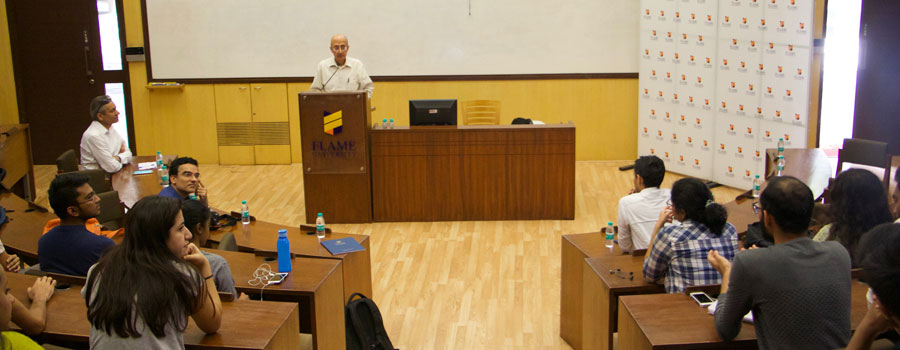Dr. Rafiq Dossani, Academic Council Member of FLAME University and Director of the RAND Center for Asia Pacific Policy (CAPP), was on campus to interact with FLAME students. In addition to his directorship of the RAND Center for Asia Pacific Policy (CAPP), Dr. Dossani is also a senior economist at the RAND Corporation, and a professor at the Pardee RAND Graduate School. He works on education, regional development, security, finance, and technology issues. Projects in education include the relationship between financing, governance and ownership in higher education, addressing the digital divide in early childhood education, college search, and blended delivery models in higher education. Projects in regional development include the political economy of trade in South Asia and Pakistan's urbanization.
Previously, Dr. Dossani was the director of Stanford University's Center for South Asia, and a senior research scholar at Stanford University's Institute for International Studies. He holds a Ph.D. in finance from Northwestern University, an M.B.A. from the Indian Institute of Management, Calcutta, and a B.A. in economics from St. Stephen's College.
He has written a chapter on the power of nudges in the context of family in a book called, “Family Engagement in the Digital Age: Early Childhood Educators as Media Mentors”. He gave a talk on the same topic to the students of FLAME University during his visit to the campus. He discussed his research on educational nudges, focusing on early childhood education and the power of technology to facilitate and improve effectiveness of these nudges. He touched upon various subjects like ‘the issue of time’ in the modern family context where the quantity versus quality of time spent by working parents with children is debatable.
Additionally, he discussed the ‘role of the teacher’ which in a way compensates for the lack of time that parents are able to spend with their children. The capacity of parents to play a role in giving technical knowledge to children was also debated. As part of this discussion he touched upon types of education and schools and whether home schooling can be a viable option. He also spoke about the ‘strength of weak ties’ in which valuable and new information can be received from people outside the closest circles.
The entire session was interactive and inclusive. The students expressed their opinions on the different issues being discussed. The session gave a good perspective on influences on early childhood education and how technology can be used positively to help child development. We, at FLAME University thank Dr. Dossani for sharing his valuable time and thoughts with us.


